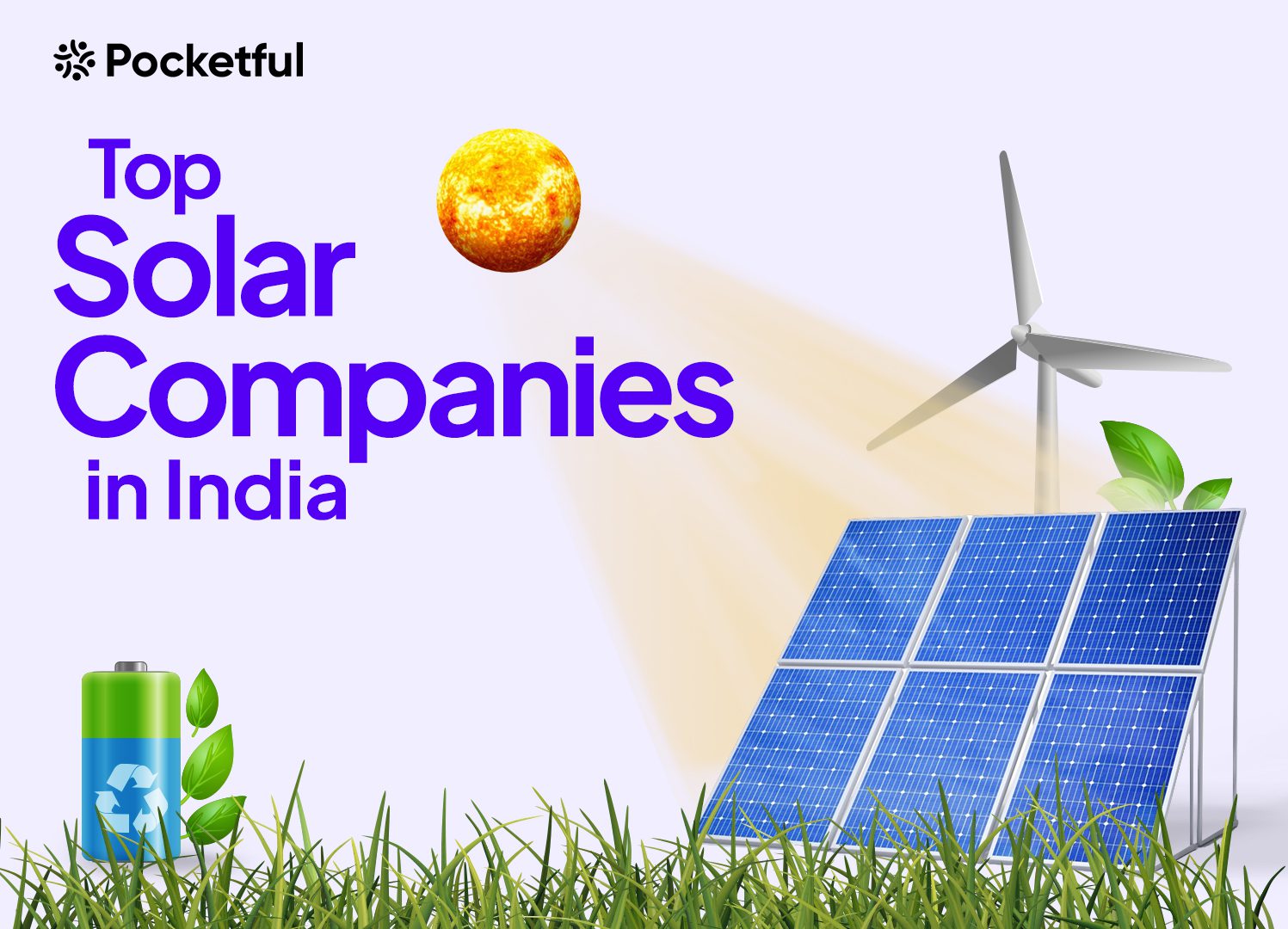| Type | Description | Contributor | Date |
|---|---|---|---|
| Post created | Pocketful Team | Mar-05-24 | |
| Add new links | Nisha | Mar-12-25 |

- Blog
- top 5 solar stocks in india
A Comparative Study on Top 5 Solar Stocks in India

Renewable energy has seen a massive uptrend in the past few years, majorly due to the overwhelming support of international entities. Fortunately, our country, India, has access to abundant solar energy, and a few companies can tap this resource’s full potential.
Today we’ll briefly overview solar firms and a performance comparison in today’s blog.
What are Solar companies?
Solar energy firms engage in various business activities that involve harvesting and converting solar radiation into electrical energy. Typically, solar companies offer a complete solution, including system design, equipment procurement, and plant installation. The businesses in this industry specialize in various areas, including solar panel manufacturing, solar inverter manufacturing, solar financing, battery manufacturing, and solar software preparation.

Reasons for choosing Solar stocks
- The government regularly provides incentives to the solar energy industry, which is why investors find them enticing investment opportunities.
- With the rising demand for solar energy in the upcoming years, this industry has seen substantial growth in recent years and has excellent long-term performance potential.
- Many solar stock companies offer high dividend yields. Hence, investors seeking steady income find them appealing.
- Investing money into solar companies gives you the mental comfort of knowing that you are positively impacting the environment.
Risks involved with Solar stocks
- The solar sector is subject to significant influence from governmental policies, incentives, and regulations. Any modifications to these factors may impact the company’s growth prospects.
- The solar industry is very young compared to other well-established market sectors; thus, any major shift in the market could impact its performance.
- Large players are interested in this industry, so the corporation may eventually have to contend with fierce competition.
- Small solar companies’ stock may be less liquid, and newly established businesses may have some financial insecurity.
Read Also: 7 Best Solar Energy Penny Stocks List 2025
Overview of Best Solar Companies in India.
Urja Global
The business was established in 1992 and initially concentrated on financial services until entering the renewable energy market in 2009. They started a project named “Urja Rath” in 2013 to promote environmentally friendly transportation.
The organization has partnered with several foreign businesses to grow their business, in addition to working on numerous solar projects throughout India.
Products and Services
They develop solar power projects after considering their client’s needs and budgets. They offer every piece of equipment needed for solar power plants. By giving their clients appropriate equipment maintenance, they offer excellent after-sale support.
Suzlon Energy
Established in 1995, Tulsi Tanti launched this worldwide provider of renewable energy solutions, with presence in over 17 countries. Pune is home to the company’s headquarters. Through its creative solutions, the company is dedicated to promoting sustainable energy solutions that lower carbon emissions. Since their entry into the solar energy industry, they have successfully installed and commissioned 340 MegaWatt of solar power across several states. In Rajasthan, the business also built a 1500 MW wind-solar hybrid park.
Products and services
They provide a large selection of wind turbines, as well as installation, upkeep, and replacement parts. Additionally, they also provide a customized selection of products to meet the needs of their customers in any climate—hot, dry, desert, humid, etc.

Sterling & Wilson
It is a multinational engineering, procurement, and construction (EPC) firm with a focus on sustainable energy initiatives. Willison Electric Works and Sterling Investment, a consortium of Shapoorji Pallonji consortium companies, merged to form the corporation in 1927. The company’s headquarters are located in Mumbai. In order to capitalize on the expanding energy industry, Sterling and Wilson Private Limited established a solar business in 2011 and started operations there. The business is present in more than 25 countries worldwide. The organization optimizes renewable energy projects’ performance, efficiency, and reliability by utilizing state-of-the-art technologies and creative ideas.
Products and services
They offer complete EPC services for energy projects, and solar power solutions, including roof-top solar installation solar parks, among other things, and their products are mostly concentrated on renewable energy. It also offers energy storage and wind power solutions to its customers.
Gita Renewable
The company was established in 2008, and its head office is in Chennai, Tamil Nadu. Gita renewable energy is firmly committed to sustainable practices and clean energy production. 2014 saw the company’s first 2 MegaWatt solar power plant successfully come online. It also won many accolades, including the state government’s “Outstanding SME Awards”.
Products and services
Using its own power plants, the company produces and distributes renewable energy. Their 2 MW power plant in Tamilnadu is currently their main source of energy.
Borosil Renewables
Borosil Renewables Limited started off its operations in 2009 to reflect a strategic move toward renewable energy. The company was granted approval in 2010 to establish the first commercial facility for producing tempered solar glass. The business introduced the first fully tempered 2 mm thick solar glass in the world in 2017; it offers exceptional strength and resilience to hail. With its current capacity, the company can produce 450 tons of solar glass per day or 2.8 gigawatts of solar modules.
The business is India’s first and only producer of solar glass.
Products and services
Tempered solar glass, the company’s main product, comes in a range of thicknesses from 2 mm to 4 mm. The company offers a diverse range of products. Additionally, the coating is self-cleaning, anti-soiling, and anti-reflective.
Comparative Study of Solar Companies
Market Capitalization
| Company | Market Capitalization |
|---|---|
| Urja Global | 1,388 |
| Suzlon Energy | 62,693 |
| Sterling & Wilson Renewable Energy | 13,678 |
| Gita Renewable Energy | 80.4 |
| Borosil Renewable Energy | 7,101 |
The table mentioned above makes it clear that Gita Renewable has the least market capitalization and Suzlon Energy has the greatest among the companies listed.
52 Week High and Low Prices
| Company | 52 Week High Date | 52 Week High Price | 52 Week Low Date | 52-Week Low Price |
|---|---|---|---|---|
| Urja Global | 5-Feb-2024 | 41.65 | 28-Mar-2023 | 6 |
| Suzlon Energy | 2-Feb-2024 | 50.6 | 28-Mar-2023 | 6.95 |
| Sterling & Wilson Renewable Energy | 9-Feb-2024 | 647 | 19-Oct-2023 | 253 |
| Gita Renewable Energy | 3-May-2023 | 70 | 10-1-2024 | 310.3 |
| Borosil Renewable Energy | 01-Feb-2024 | 669 | 28-Mar-2023 | 380 |
Income Statement (FY23)
| Particulars | Urja Global | Suzlon Energy | Sterling & Wilson | Gita Renewable | Borosil Renewable Energy |
|---|---|---|---|---|---|
| Total Income | 41.41 | 5,990 | 2,125 | 8.87 | 707.08 |
| Total Expenses | 39.43 | 5,819 | 3,304 | 1.01 | 587.9 |
| Net Profit | 1.97 | 2,887.29 | (1,174) | 7.85 | 88.54 |
Balance Sheet (FY23)
| Particulars | Urja Global | Suzlon Energy | Sterling & Wilson | Gita Renewable | Borosil Renewable Energy |
|---|---|---|---|---|---|
| Total Asset | 285 | 6,047.9 | 3,190 | 14.19 | 1,391 |
| Inventory | 20 | 760 | 1.57 | – | 174 |
| Trade Payables (Non-current) | 65.6 | 1,061 | 650 | 0.41 | 43.73 |
Cash Flow Statement (FY23)
| Particulars | Urja Global | Suzlon Energy | Sterling & Wilson | Gita Renewable | Borosil Renewable Energy |
|---|---|---|---|---|---|
| Cash flow from Operating Activities | 0.91 | (31.15) | (1829) | 15.2 | 25.64 |
| Cash flow from Investing Activities | 0.64 | 407 | (11.78) | 6.85 | (220) |
| Cash flow from Financing Activities | (1.09) | (495.51) | 1,431.26 | (26.44) | 184.64 |
Key Ratios (FY23)
| Particulars | Urja Global | Suzlon Energy | Sterling & Wilson | Gita Renewable | Borosil Renewable Energy |
|---|---|---|---|---|---|
| Basic EPS | 0.03 | 2.64 | -61.65 | 19.11 | 6.79 |
| ROCE (%) | 1.15 | 20.69 | -210.97 | 57.15 | 10.73 |
| 3 Year CAGR Sale(%) | -50.81 | 47.72 | -39.87 | -23.62 | 59.31 |
| P/E (x) | 228.33 | 2.99 | -4.73 | 4.69 | 60.51 |
| P/B (x) | 2.14 | 8.82 | -24.62 | 2.68 | 6.13 |
It is clear from the previously described comparative study of the company’s financials that some businesses are currently profitable while others are losing money and the growth in sales of the businesses is uneven.
Read Also: Top Power Companies in India
Conclusion
Investment in the solar energy business carries a high level of risk, but it also has the potential to be very profitable. As with any investment, you must exercise patience and perform due diligence.
This is the industry to choose if you are a long-term investor who has funds for long term investments.
However, before making any investing decisions take your investment horizon and risk tolerance into account.
Frequently Asked Questions (FAQs)
What potential obstacles can solar companies encounter in the present market?
People need to be made aware of the significance of solar energy in order for them to begin leaning toward it, as they are not well-informed about the future of solar companies.
What are some possible avenues for expansion in the solar sector in the future?
The industry might grow significantly as a result of favorable legislation, market expansion, business model improvements, and technological advancements and with the government’s incentive support for the promotion of renewable energy, this all would pave the way for a more sustainable and energy-secure future.
What role do solar companies play in maintaining a sustainable environment?
Solar businesses are important for preserving a sustainable environment because they lower emissions, enhance the quality of the air and water, conserve resources, create green jobs, and advance technology.
Which solar company is the best place to put money?
Every solar firm aims to succeed in its market, but all businesses have strengths and weaknesses. For this reason, before making any investment decisions, it is advised to thoroughly review the business strategy and financial statements of each company.
Are solar companies profitable?
While some solar companies are profitable, many are not. The market for solar energy is still quite small, so many companies have yet to grow to the point where they can profit. Nonetheless, businesses in the market longer are making good profits.
Disclaimer: The securities, funds, and strategies mentioned in this blog are purely for informational purposes and are not recommendations.
Disclaimer
The securities, funds, and strategies discussed in this blog are provided for informational purposes only. They do not represent endorsements or recommendations. Investors should conduct their own research and seek professional advice before making any investment decisions.